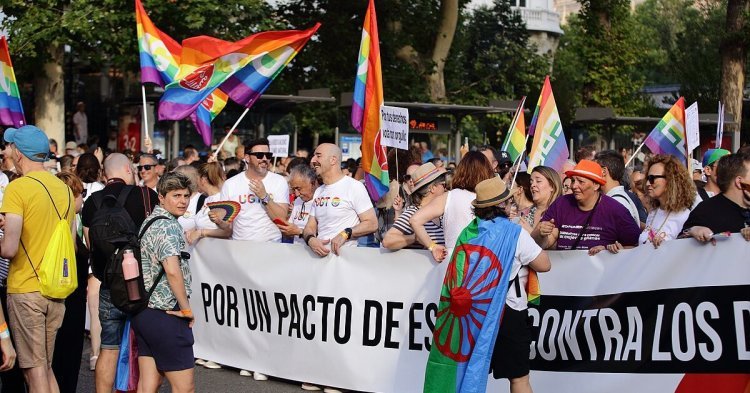Today, Spain is well-known for its welcoming attitude towards the LGBTQI+ community, making it a popular tourist destination for its members. However, it spent much of the last century under the authoritarian regime of Francisco Franco, which discriminated against any minority group. Take a look at the development of LGBTQI+ rights in Francoist Spain and remember one of the most emblematic events in Spanish queer history, the 1971 Begoña Passage Raid, also known as the “Spanish Stonewall," the Spanish equivalent of the early riots for queer rights in the U.S. in 1969.
Francoism and Its Impact on the Historical Development of the LGBTQI+ Community in Spain
Francisco Franco established an authoritarian regime in Spain in 1939, lasting until 1975. The main ideological idea behind the regime was national Catholicism, which implied that any deviation from heteronormativity and traditional thinking about family was condemned and even legally punished. The first law that discriminated against members of the LGBTQI+ community was the Law of Vagrants and Miscreants. This law entered into force even before the official declaration of the regime, and was enforced from 1933 until 1970. That year, it was replaced by an even more discriminatory law, the Law of Dangerousness and Social Rehabilitation. Among the sanctions that members of the queer community could receive for behaviour that the regime considered sexual deviance were forced labour, torture, and imprisonment.
Franco died in 1975, and Spain was restored to a monarchy that aimed for greater democracy for Spanish citizens, but the law remained in force until 1978, when, after many protests in major Spanish cities such as Barcelona, Madrid, and Bilbao, queer identity was removed from the law. As far as the trans community was concerned, however, it was considered a major social taboo and was viewed from a medical perspective rather than from a human rights one.
What Is the Begoña Passage, and What Was Its Meaning? The Night of the Raid
The Begoña Passage, now Passage Gil Vicente, is an alley located in the centre of Torremolinos, in Málaga, southern Spain. Since the 1960s, this town has been known for its moderate attitude towards the LGBTQI+ community and has become a sort of oasis for freedom for all gender and sexual identities, despite the harsh dictatorship. National and international celebrities have met here, including John Lennon and Amanda Lear. The Begoña Passage was the place with the largest concentration of gay-friendly bars and discos. However, with the proclamation of a new and harsher discrimination law in 1970, pressure was put on businesses by the state to cease operations. Nevertheless, the then-Spanish gay paradise was not about to close down and continued to serve as a popular gay tourism destination.
But all of that changed on the night of June 25th, 1971. The mayor of Málaga, Víctor Arroyo, ordered the closure of several of the most popular clubs the day before and arranged a police raid the next day. This in itself was not unusual in Torremolinos, but this time it was no small raid, whereupon the police of the time identified up to 300 people, of whom an estimated 110 to 120 were arrested. This was an unprecedented raid on members of the LGBTQI+ community. Despite the gravity of the situation, the raid did not have much resonance because the regime was still suppressing minority rights and any protests against Franco’s dictatorship, and so the event became an important milestone only after the end of Francoism a few years later.
By taking place around the time of the gay rights protests in the U.S. and Torremolinos being a popular site, the raid became widely known and has since been regarded as a symbol of the struggle for gay liberation in Spain, sometimes referred to as the “Spanish Stonewall.”
Aftermath
Torremolinos eventually had to cut back on its nightlife, but the protests for equality continued, increasingly on a larger scale, especially after the death of Franco in 1975, when tens of thousands of people took part in protests in major cities such as Barcelona or Madrid.
In the late 1970s and early 1980s, Spain was going through a period of social transition due to the regime change, especially in the cultural sphere. Underground culture and the portrayal of minority groups in society were prominent, so people’s opinions on the LGBTQI+ community in general began to normalise, leading to the fact that nowadays Spain is one of the most queer-friendly countries in the world. This is evident by statistics from organisations such as ILGA-Europe, which conducts an annual survey of the level of rights of the LGBTQI+ community in European countries, and Spain regularly comes in at the top. Moreover, Torremolinos is still a popular destination for queer tourism today.

Follow the comments: |
|
